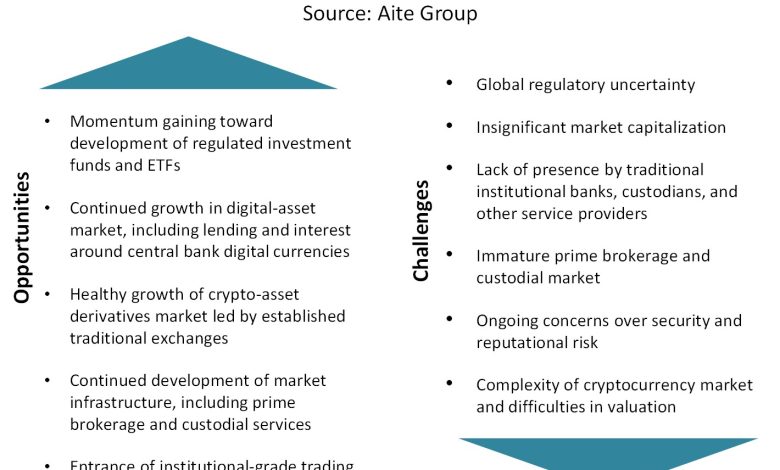The Impact of Cryptocurrency on Traditional Trading Platforms

- The Rise of Cryptocurrency: Disrupting Traditional Trading Platforms
- Exploring the Evolution of Trading with Cryptocurrency
- Challenges and Opportunities: Cryptocurrency’s Influence on Traditional Trading
- Adapting to the Digital Age: How Traditional Trading Platforms are Responding to Cryptocurrency
- The Future of Trading: Integrating Cryptocurrency into Traditional Markets
- Risk and Reward: Navigating the Impact of Cryptocurrency on Traditional Trading Platforms
The Rise of Cryptocurrency: Disrupting Traditional Trading Platforms
Cryptocurrency has been on the rise in recent years, disrupting traditional trading platforms and revolutionizing the way people invest and trade. The decentralized nature of cryptocurrencies has challenged the centralized control of traditional financial institutions, offering users more autonomy and control over their assets.
One of the key advantages of cryptocurrency is its ability to facilitate peer-to-peer transactions without the need for intermediaries, such as banks or brokers. This has significantly reduced transaction costs and processing times, making trading more efficient and cost-effective for users.
Furthermore, the transparency and security features of blockchain technology, which underpins most cryptocurrencies, have made trading platforms more secure and resistant to fraud and hacking attempts. This has instilled greater trust among users and attracted more investors to the cryptocurrency market.
As a result, traditional trading platforms have been forced to adapt to the changing landscape by incorporating cryptocurrencies into their offerings. Many established financial institutions have started to offer cryptocurrency trading services to meet the growing demand from their clients.
In conclusion, the rise of cryptocurrency has had a profound impact on traditional trading platforms, pushing them to evolve and embrace the new digital asset class. This trend is likely to continue as cryptocurrencies become more mainstream and widely accepted in the financial industry.
Exploring the Evolution of Trading with Cryptocurrency
Cryptocurrency has revolutionized the way trading is conducted, offering a decentralized and secure alternative to traditional trading platforms. The evolution of trading with cryptocurrency has opened up new opportunities for investors and traders alike. One of the key advantages of cryptocurrency trading is the elimination of intermediaries, allowing for direct peer-to-peer transactions. This not only reduces transaction costs but also increases the speed of trading.
Furthermore, the 24/7 nature of cryptocurrency markets provides traders with the flexibility to trade at any time, unlike traditional markets that operate within specific hours. This round-the-clock trading capability allows for greater liquidity and the ability to capitalize on market movements as they happen. Additionally, the transparency of blockchain technology ensures that all transactions are recorded on a public ledger, providing a level of security and trust that is unparalleled in traditional trading platforms.
As cryptocurrency continues to gain mainstream acceptance, more traditional trading platforms are integrating digital assets into their offerings. This convergence of traditional and cryptocurrency trading is blurring the lines between the two worlds, creating new opportunities for investors to diversify their portfolios. With the evolution of trading with cryptocurrency, investors can now access a wider range of assets and markets, allowing for greater flexibility and potential returns.
In conclusion, the impact of cryptocurrency on traditional trading platforms has been profound, ushering in a new era of trading that is decentralized, secure, and accessible to all. As the evolution of trading with cryptocurrency continues, it is clear that digital assets are here to stay and will play an increasingly important role in the future of finance.
Challenges and Opportunities: Cryptocurrency’s Influence on Traditional Trading
As cryptocurrency continues to gain popularity, it presents both challenges and opportunities for traditional trading platforms. One of the main challenges is the volatility of the cryptocurrency market, which can make it difficult for traders to predict price movements accurately. This unpredictability can lead to significant losses for those not well-versed in the intricacies of cryptocurrency trading.
On the other hand, the rise of cryptocurrency also brings opportunities for traditional trading platforms to expand their offerings and attract a new generation of traders. By incorporating cryptocurrency trading into their platforms, traditional brokers can tap into a growing market and diversify their revenue streams.
Additionally, the decentralized nature of cryptocurrency allows for 24/7 trading, which can be both a challenge and an opportunity for traditional platforms. While this constant availability can lead to increased trading volume and potential profits, it also requires platforms to adapt to a non-stop trading environment.
In conclusion, the influence of cryptocurrency on traditional trading platforms is undeniable. While it presents challenges such as market volatility and the need for constant adaptation, it also offers opportunities for growth and diversification. By embracing cryptocurrency and incorporating it into their offerings, traditional trading platforms can position themselves for success in the evolving financial landscape.
Adapting to the Digital Age: How Traditional Trading Platforms are Responding to Cryptocurrency
Traditional trading platforms are facing the challenge of adapting to the digital age with the rise of cryptocurrency. In response to this new trend, these platforms are implementing various strategies to incorporate digital assets into their existing systems. One way they are doing this is by adding cryptocurrency trading options alongside traditional assets such as stocks and commodities. This allows users to diversify their portfolios and take advantage of the growing popularity of digital currencies.
Another way traditional trading platforms are responding to cryptocurrency is by enhancing their security measures to protect users’ digital assets. With the decentralized nature of cryptocurrencies, the risk of hacking and theft is higher compared to traditional assets. As a result, platforms are investing in advanced encryption technologies and multi-factor authentication to ensure the safety of users’ funds.
Moreover, traditional trading platforms are also exploring the possibility of integrating blockchain technology into their operations. Blockchain, the underlying technology behind cryptocurrencies, offers benefits such as transparency, immutability, and efficiency. By leveraging blockchain, trading platforms can streamline processes, reduce costs, and enhance trust among users.
Additionally, some traditional trading platforms are partnering with cryptocurrency exchanges to offer a wider range of digital assets to their users. This collaboration allows users to access a diverse selection of cryptocurrencies without having to create accounts on multiple platforms. By expanding their offerings to include cryptocurrencies, traditional trading platforms are staying relevant in the ever-evolving financial landscape.
Overall, traditional trading platforms are embracing the digital age by responding to the growing demand for cryptocurrency trading. By incorporating digital assets, enhancing security measures, exploring blockchain technology, and forming partnerships with cryptocurrency exchanges, these platforms are adapting to the changing needs of investors in the digital era.
The Future of Trading: Integrating Cryptocurrency into Traditional Markets
As the world of trading continues to evolve, the integration of cryptocurrency into traditional markets is becoming increasingly prevalent. This shift is reshaping the way investors approach trading, offering new opportunities and challenges alike.
One of the key advantages of integrating cryptocurrency into traditional markets is the potential for increased liquidity. Cryptocurrencies operate on a 24/7 basis, allowing for trading at any time of day or night. This can help to reduce the impact of market fluctuations and provide more flexibility for traders.
Additionally, the use of cryptocurrency can help to streamline the trading process, making transactions faster and more efficient. With blockchain technology, trades can be executed quickly and securely, reducing the risk of fraud or errors.
However, the integration of cryptocurrency into traditional markets also presents challenges. One of the main concerns is the regulatory environment surrounding cryptocurrencies, which can vary significantly from one jurisdiction to another. This can create uncertainty for traders and investors, impacting the overall stability of the market.
Overall, the future of trading looks to be increasingly intertwined with cryptocurrency. By embracing this new technology and adapting to the changing landscape, traders can position themselves for success in the evolving market.
Risk and Reward: Navigating the Impact of Cryptocurrency on Traditional Trading Platforms
When considering the impact of cryptocurrency on traditional trading platforms, it is essential to weigh the risks and rewards associated with this new form of digital currency. Cryptocurrency has the potential to revolutionize the way we think about investing and trading, but it also comes with its own set of challenges.
One of the main risks of incorporating cryptocurrency into traditional trading platforms is the volatility of the market. Cryptocurrency prices can fluctuate wildly in a short period, leading to significant gains or losses for investors. This unpredictability can make it difficult for traditional traders to navigate the market effectively.
On the other hand, the rewards of integrating cryptocurrency into traditional trading platforms can be substantial. Cryptocurrency offers a level of decentralization and security that is unmatched by traditional forms of currency. Additionally, the potential for high returns on investment has attracted many traders to the world of cryptocurrency.
Overall, navigating the impact of cryptocurrency on traditional trading platforms requires a careful balance of risk and reward. By understanding the unique challenges and opportunities that cryptocurrency presents, traders can make informed decisions that will help them succeed in this evolving market.



